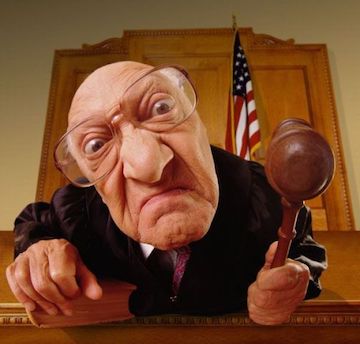Alcohol’s Three-Tier System Is Losing Its Power to Impress Judges
 It was really an unusual takedown of an attorney by a judge. It was something you don’t see (or hear) very often. And it indicates what may be a significant change in the way the “three-tier” system is understood by members of the judicial branch.
It was really an unusual takedown of an attorney by a judge. It was something you don’t see (or hear) very often. And it indicates what may be a significant change in the way the “three-tier” system is understood by members of the judicial branch.
The incident I want to draw readers’ attention to occurred during oral arguments at the 8th Circuit Court of Appeals last Thursday in the case of Sarasota Wine v Schmidt. This case challenges Missouri’s law that bars out-of-state wine retailers from shipping to Missouri consumers while Missouri retailers are allowed to.
At the lower, federal district court level, a judge ruled that the case should be dismissed, agreeing with the state that there was no dormant commerce clause violation when Missouri barred out of state retailers from selling to Missouri consumers. The consumer and retailer plaintiffs appealed and want the 8th Circuit Court of Appeals to rule that this decision was rendered without any evidence presented and that the case should be remanded back down to the district court for discovery and briefings by each party.
It is important to note that this retail wine shipping case is being treated as very important by those who oppose a competitive wine commerce landscape. Among those who issued amicus briefs supporting the state’s protectionist restrictions on competition are the Wine & Spirit Wholesalers of America, The American Beverage Licensees (a national retailer association), the National Beer Wholesalers of America and the Missouri Beer Wholesalers Association.
The oral arguments at the 8th Circuit Court of Appeals began with retailer and consumer plaintiffs’ attorney Robert Epstein (of Granholm v Heald fame) presenting his case with only two short interruptions by the judges to ask very basic questions.
Then, the attorney for the state of Missouri, Zachary Bluestone, was invited to present his counter-argument. He began this way:
“This case is about nothing less than the continued viability of the three-tier system.”
It was with that first sentence and no more than 15 seconds into Bluestone’s presentation that Judge James B. Loken jumped in with this:
“Counsel, that’s just not true. That’s such an exaggeration that I’m not going to let you start with that….We had no idea whether Granholm would apply to Missouri’s three-tier system and [retailer shipping] would mean the death knell of it. I’m sure there are some powerful lobbyists in Missouri who would consider it [retail shipping] a death knell, but that’s almost irrelevant.”
This was a rebuke. A rebuke of an attorney by a judge that I’ve not seen delivered quite this forcefully…ever. Gathering himself, Mr. Bluestone went on to make the main point in the State’s case defending their law barring retailer shipping:
“Out of state retailers are not subject to Missouri regulation. More importantly, the alcohol they sell never passes through the three-tier system.”
And again, this idea of the vital importance of the three-tier system didn’t sit well with Judge Loken who again immediately jumped in with this:
“Counsel, I frankly don’t care about the three-tier system. I care about harmonizing the 21st Amendment with the Commerce Clause. If I read Granholm, as confirmed in Tennessee Wine, the three-tier system, which is absolutely a valid way for states to accomplish its 21st Amendment objectives, must yield or be subject to Commerce Clause restrictions. It doesn’t mean it can’t be done. It may or may not look differently at the end of that if the three-tier system has been inherently disrupted and replaced by the modern economy. The Commerce Clause trumps the 21st Amendment to the extent that interstate discrimination cannot be justified by 21st Amendment principles.”
Once again, this was a rebuke. And a pretty forceful one. Missouri’s attorney never really got his bearings back. The judges continued to pepper him with adversarial questions throughout his delivery.
As I listened to the oral arguments live, it was at the moment described above that I thought to myself, when Robert Epstein is called back up to make final statements for the plaintiffs he really shouldn’t get off his chair. He really shouldn’t say a word. He should merely tell the judges, “We have nothing further.” Anything else would have been akin to sending Ricky Henderson to steal second base in the top of the 9th while his team was winning 10-0. In the end, Mr. Epstein made a quick comment and sat down.
If you follow these sorts of wine shipping cases, I urge you to listen to the recording of the oral arguments.
The wheels of justice turn very slowly, particularly when you are dealing with federal court cases. This case began in 2017. It likely won’t be ended until the end of 2021. Meanwhile, there are eight other very similar cases working their way through the federal court system. Additionally, there is a possibility that one of those cases will be accepted by the Supreme Court by the end of this year.
However, what this particular oral argument tells me is that the legal legitimacy of the three-tier system does not carry nearly the weight it once did. Twenty years ago it would have been very unlikely to hear a judge publicly rebuke an attorney for giving so much weight to the legitimacy and importance of that system. This all bodes well for consumers, wine retailers, free trade, and modernity’s long-standing effort to push its nose into the alcohol regulatory tent.

Leave a Reply